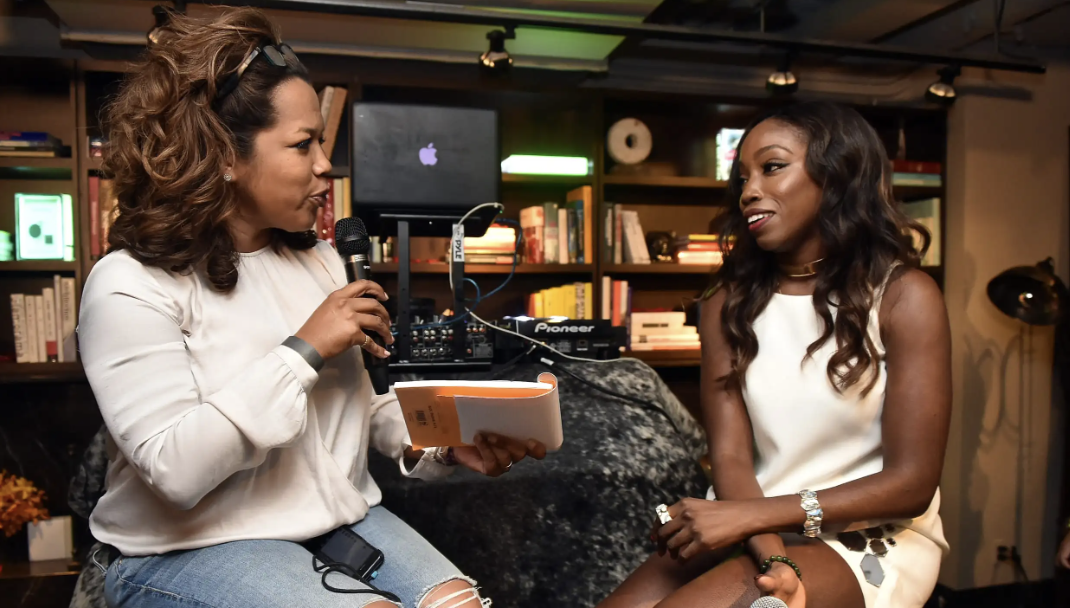
August 2, 2023
Award-Winning Journalist And Author Danyel Smith Reflects On Her Service To Black Culture
“You look up. It’s decades later,” said Danyel Smith. “And you’re thinking of Stephanie Mills singing ‘When I think of home, I think of a place where’s there’s love overflowing.'”
Today, she is home. The award-winning journalist and three-time author, who has been serious about shining a bright light on Black music, is back on the West Coast.
For Smith, family is home. It’s the place where her mom gifted her her first biography, She Wanted to Read: The Story of Mary McLeod Bethune. “I love that book. And I still have it,” Smith told BLACK ENTERPRISE. “I didn’t realize that little girls could be rewarded for being strong and intentional. She’s such a model on so many levels, as a woman and a little girl.”
But this California girl longed to write. She knew she wanted to be a storyteller as early as Mrs. Gibbs’ third-grade class. “You can tell a story and then give it to people in some sort of package? So they can experience it,” Smith said, recounting her 8-year-old thoughts. She remembered constructing her own book in that class. “It felt so gratifying. I wish I still had it,” Smith said, chuckling. “It was written, like Nas would say.”

An early-’80s middle schooler, Smith attended a Catholic, all-girl multiracial institution in Los Angeles. She remembered studying Black artistry and getting into rap when it was fresh and new. This was when Sugarhill Gang’s 1979 “Rapper’s Delight” had the “playground on a tilt,” as Smith once described in The New York Times. This was when Sugarhill’s Wonder Mike was rapping “I’d like to say hello/To the Black and the white/The red and the brown/The purple and yellow.”
“Black culture is just as important to global culture continuing to exist and move and grow,” Smith explained to BE. “Sometimes it is the party. But a lot of times, it is about very serious things like cultural segregation, geographical segregation… cultural credit. It’s about who gets to be labeled a genius and who doesn’t. These are not small things.
“It was very clear to me that Black people in music were not receiving the credit culturally or financially for their creative work,” Smith continued. “I saw that white artists were paid much more attention to… And I wanted to be a part of changing that.”
Smith was always a magazine girl, having started her career in 1989. She gave a shout-out to two trailblazing Black women in the magazine industry: Right On! magazine editorial director Cynthia Horner and Susan Taylor, who was editor-in-chief of Essence. “Cynthia Horner was creating Right On! magazine when we didn’t have much of anything, especially as teenagers,” Smith remembered. “She is probably the first Black woman editor-in-chief that I saw with my own eyes.”

In the early ’90s, Smith served as the music editor of SF Weekly and was freelancing as a reporter for Spin, where she wrote a pop culture/music column called “Dreaming America.” In 1993, she moved to New York to become R&B editor at Billboard magazine. From 1994 to 1996, she joined Vibe Media Group as a music editor until she took a break to pursue an arts fellowship at Northwestern’s Medill School of Journalism. This was the era when her good friends Tupac Shakur and Biggie Smalls were killed. A time when mainstream media tried to convince everyone that hip-hop was dead. In 1997, Smith was promoted as the first Black and woman editor-in-chief of Vibe and vibe.com. People were in mourning. So she put Kirk Franklin on the cover.
“I was just working,” said Smith. “For the most part, happily so.” Though messages of self-care and rest are much louder today, Smith was proud to walk into the Vibe office every morning, where she worked with some of the “best” and “brilliant” multicultural people. Mostly Black people. “Black music needed me. I literally had a place in which I was allowed to be as creative as I could be and was rewarded for that,” she said. “I was living.”

The ’90s and 2000s were both tragic and uplifting. “When Lauryn Hill won all the Grammys. When Outkast won, also for Album of the Year. These are huge celebratory moments in culture,” Smith recalled. “The ups and downs of Snoop’s career… Destiny’s Child. And that shifting into Beyoncé’s solo career… The neo-soul movement. Erykah Badu on the cover. The T.I. covers….” and the rest is history.

Smith is proud to have witnessed it all. But her advocacy journey came with challenges. She called it a “crisis of confidence.” Those who worked with Smith recognized her as a confident woman. “She is. And she isn’t,” Smith said. In her 20s, she had to get her confidence together. “I had to deal with the fact that men were not interested in a Black woman writing about rap music and hip-hop culture.”
Decades later, Smith is still on an incredible journey of rhythm, resilience, and the power of Black culture. She has been a producer and writer at ESPN and a contributor to numerous publications. Currently she hosts Black Girl Songbook, a music talk show highlighting Black women artists.
“It’s a calling, and I am committed,” Smith declared. “I am in service of Black culture.”